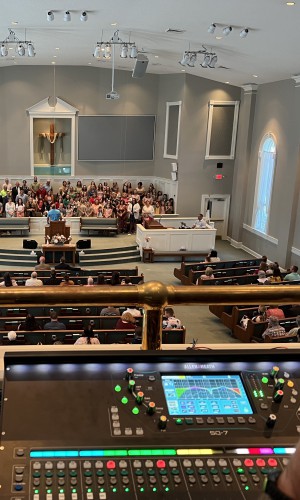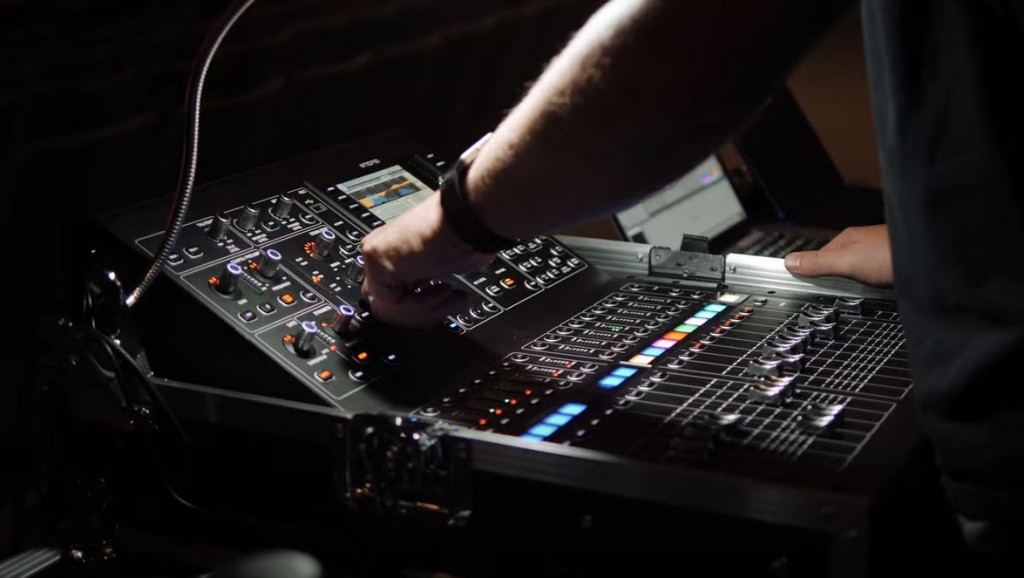August 2, 2023
A thoughtfully crafted sound system fosters a spiritually uplifting worship experience in churches. At the core of these systems lies the church sound board, sometimes called an audio mixer or mixing console. This unassuming equipment is the nerve center for managing audio inputs and outputs, ensuring the congregation hears crystal-clear music, spoken word, and other essential elements during services.
In this article, we will explore the role of soundboards in church settings, the types available, and how they contribute to the worship experience.
What Does a Church Sound Board Do?
Church soundboards are sophisticated electronic devices that handle and manipulate audio signals from various sources. Their primary function is to mix and balance these audio inputs to create a coherent and harmonious sound output. The audio inputs typically include microphones, musical instruments, playback devices, and other sound-producing sources used in a church setting.
Sound engineers or volunteers operate the soundboard, adjusting each input channel's volume, tone, and other parameters to ensure the sound reaches the congregation at the right level and quality. By skillfully blending the different elements of the worship service, the soundboard helps to eliminate audio issues like feedback, excessive noise, or uneven sound distribution, thus enabling a seamless worship experience for all attendees.
Audio mixers are crucial for processing and mixing audio signals from various sources. Their output is connected to amplifiers or powered speakers to drive the actual speakers to deliver sound to the audience.

Types of Sound Boards in Church Settings
Churches come in various sizes and architectural designs and acoustics, and each congregation has unique sound needs. As a result, several types of soundboards are used in church settings, ranging from simple analog mixers to sophisticated digital consoles.
Here are some common types:
1. Analog Sound Boards: These traditional mixers use physical knobs and faders to control audio signals. They are relatively straightforward and often preferred by smaller churches with limited sound requirements. Analog boards offer a warm and organic sound but may lack the advanced features found in digital alternatives.
2. Digital Sound Boards: Digital mixing consoles have become increasingly popular due to their versatility and enhanced capabilities. They can handle more inputs and outputs and offer features like built-in effects, EQ adjustments, scene presets, and remote control options. Digital soundboards are ideal for medium to large-sized churches with complex audio setups.
3. Hybrid Sound Boards: Some churches opt for a hybrid setup, combining analog and digital elements. For instance, they might use analog preamps connected to a digital mixing engine, offering the best of both worlds.
Enhancing the Worship Experience with a Church Sound Board
A well-chosen configured soundboard can significantly impact the worship experience in several ways:
1. Clarity and Balance: By skillfully managing audio inputs, the soundboard ensures that all worship service elements are clear and well-balanced, allowing the congregation to fully immerse themselves in the experience.
2. Engagement: High-quality audio enhances engagement and participation during sermons, music performances, and other church activities, fostering a deeper community among the congregation.
3. Accessibility: Properly configured sound systems, including soundboards, make religious services accessible to individuals with hearing impairments, ensuring everyone can partake in the worship experience.

So, when should a church have a board? Whenever the sound engineers plan to manage audio inputs, adjust volume levels, or balance auditory elements. Whether a church is small or large, using microphones, musical instruments, or playback devices, a well-configured soundboard is necessary to provide attendees with a seamless and harmonious audio output.
A church soundboard may seem like a humble piece of equipment, but its impact on the worship experience is profound. From managing audio inputs to crafting a harmonious output, soundboards are crucial in delivering a spiritually enriching atmosphere for congregants. As churches continue to evolve and adapt their sound systems to meet the needs of their unique settings, investing in a well-suited soundboard becomes a vital step toward creating an uplifting and immersive worship experience for all.
